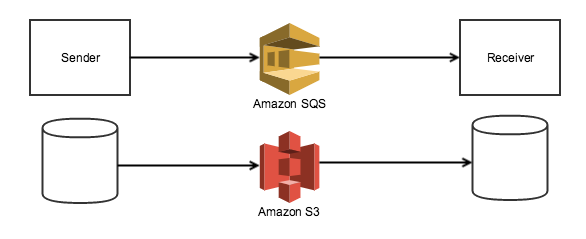Utility lib for secure SQS
This library provides an extension of the standard AmazonSQSClient, adding the following features in a transparent way:
- Strong client-side encryption.
- Compression of messages.
- Supports arbitrary large messages. (Messages larger than 240 KB after compression and encryption will use S3).
- Supports automatic publishing of SNS events when SQS messages are sent.
For more details, please refer to the Amazon SQS documention:
Java 6 or later is required. Further, since strong encryption is used, Java Cryptography Extension (JCE) Unlimited Strength Jurisdiction Policy must be installed (available from Oracle).
Binaries and dependency information for Maven, Ivy, Gradle and others can be found at https://mvnrepo.cantara.no.
<repository>
<id>cantara-releases</id>
<name>Cantara Release Repository</name>
<url>https://mvnrepo.cantara.no/content/repositories/releases/</url>
<snapshots>
<enabled>false</enabled>
</snapshots>
</repository>
<dependency>
<groupId>no.cantara.aws</groupId>
<artifactId>sqs-util</artifactId>
<version>x.y.z</version>
</dependency>
AmazonSQSSecureClient sqsClient = AmazonSQSSecureClient.create(...);
String queueName = ...;
String payload = ...;
String queueUrl = sqsClient.getQueueUrl(queueName).getQueueUrl();
// Add a message attribute "foo".
MessageAttributeValue someAttribute = new MessageAttributeValue().withDataType("String").withStringValue("bar");
SendMessageRequest messageRequest = new SendMessageRequest()
.withQueueUrl(queueUrl)
.withMessageBody(payload)
.addMessageAttributesEntry("foo", someAttribute);
String messageId = sqsClient.sendMessage(messageRequest).getMessageId();
AmazonSQSSecureClient sqsClient = AmazonSQSSecureClient.create(...);
String queueName = ...;
String queueUrl = sqsClient.getQueueUrl(queueName).getQueueUrl();
ReceiveMessageRequest receiveRequest = new ReceiveMessageRequest(queueUrl))
.withMaxNumberOfMessages(10)
.withWaitTimeSeconds(20) // Enables long-polling
.withMessageAttributeNames("All"); // Enables the reception of all message attributes
List<Message> messages = sqsClient.receiveMessage(receiveRequest).getMessages();
for (Message message : messages) {
process(message);
// Remember to delete the message, or it will be redelivered.
sqsClient.deleteMessage(queueUrl, message.getReceiptHandle()); }
This library also offers an API for transferring files with meta data using a combination of SQS and S3.
A file event is sent (as a JSON message) over SQS. It contains meta data for the file as well as a reference to an S3 object. Upon reception of the file event message, the API is used to download the file from S3 to a local file.
AmazonSQSSecureClient sqsClient = AmazonSQSSecureClient.create(...);
File sourceFile = ...;
String queueName = ...;
String queueUrl = sqsClient.getQueueUrl(queueName).getQueueUrl();
SendMessageRequest request = new SendMessageRequest()
.withQueueUrl(queueUrl);
.addMessageAttributesEntry("SomeMessageType",
new MessageAttributeValue().withDataType("String").withStringValue("orderAttachment"));
FileTransferEvent sentEvent = new FileTransferEvent();
sentEvent.setFilename("photo.jpeg");
sentEvent.setSize(sourceFile.length());
sentEvent.setS3Object(UUID.randomUUID().toString());
// Example user-defined properties.
sentEvent.getAttributes().put("pointId", "123456");
sentEvent.getAttributes().put("orderId", "789");
FileTransferUtil.sendFile(sqsClient, request, sentEvent, sourceFile);
AmazonSQSSecureClient sqsClient = AmazonSQSSecureClient.create(...);
String queueName = ...;
String queueUrl = sqsClient.getQueueUrl(queueName).getQueueUrl();
// Receive (zero or more) SQS messages.
Message message = sqsClient.receiveMessage(queueUrl).getMessages().get(0);
// Check message type and download file if appropriate.
String messageType = message.getMessageAttributes().get("SomeMessageType").getStringValue();
if ("orderAttachment".equals(messageType)) {
File targetFile = File.createTempFile("target", ".tmp");
FileTransferEvent receivedEvent = FileTransferUtil.receiveFile(sqsClient, message.getBody(), targetFile);
}
// Remember to delete the message, or it will be redelivered.
sqsClient.deleteMessage(queueUrl, message.getReceiptHandle());
It's recommended (although not required) to specify an S3 bucket policy that requires all S3 objects to use server-side encryption.
Further, it's recommended to specify a lifecycle rule for the S3 bucket that permanently deletes all objects after 14 days.
SQS queues are recommended to be configured with a default "Receive Message Wait Time" of 20 seconds, and must have a "Maximum Message Size" of 256 KB. The "Message Retention Period" must not be longer than the S3 lifecycle period (normally 14 days).
Often you would like an AWS Lambda to be triggered when an SQS message is available on a queue. Unfortunately, Amazon doesn't support this directly, but this library offers a work-around by (optionally) publishing an SNS event whenever a message is sent. The SNS event can then trigger the execution of a Lambda.
Use {@link no.cantara.aws.sqs.AmazonSQSSecureClient#withSnsNotificationsEnabled(String, boolean)} to turn on SNS notifications.
Remember to create a subscription in the SNS Console. Select protocol "AWS Lambda" and select the Lambda you want to be triggered.
- update dependencies
- update dependencies
- update aws-sdk dependencies
- update aws-sdk dependencies and update AmazonSQSSecureClient to stop using the deprecated constructors in the AWS SDK.
- Update dependency versions
- Update version of aws-sdk dependencies to 1.11.78

